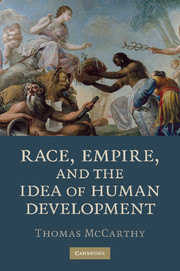Book contents
- Frontmatter
- Contents
- Acknowledgments
- Introduction
- Part One
- Part Two
- 5 What may we hope? Reflections on the idea of universal history in the wake of Kant
- 6 Liberal imperialism and the dilemma of development
- 7 From modernism to messianism: reflections on the state of “development”
- Conclusion: the presence of the past
- Index
- References
5 - What may we hope? Reflections on the idea of universal history in the wake of Kant
Published online by Cambridge University Press: 05 June 2012
- Frontmatter
- Contents
- Acknowledgments
- Introduction
- Part One
- Part Two
- 5 What may we hope? Reflections on the idea of universal history in the wake of Kant
- 6 Liberal imperialism and the dilemma of development
- 7 From modernism to messianism: reflections on the state of “development”
- Conclusion: the presence of the past
- Index
- References
Summary
The philosophy of history is now widely believed to be extinct. How could anyone take seriously the idea of progress in the wake of the bloodiest century on record, in the faces of its 100 million victims? If the temptation to indulge in this genre of thought should prove too strong to resist, one might look instead to Verfallsgeschichten of Nietzschean or Heideggerian provenance. But it would be best if we learned to resist the temptation altogether, perhaps through assembling postmodernist reminders of the conditions of impossibility of grand metanarratives or postcolonialist reminders of the massive injustices the latter were used to underwrite, or through a Benjaminian remembrance of and solidarity with the countless, voiceless victims of “progress.” And if this proves insufficient, we might recall the long-standing epistemological and methodological objections to the philosophy of history in its classical variations. The institutionalization and expansion of academic history and empirical social research, which were already underway as Hegel and Marx fashioned the culminating works of that genre, eventually rendered it infeasible.
Marx's materialist turn away from philosophy as the medium in which to comprehend history and society was subsequently continued in directions that were incompatible with the residual Hegelianism of his own constructions. To be sure, general accounts of the sociocultural development of the species as a whole did not thereby disappear; rather, they assumed the altered form of macrohistorical theories of social change – from Durkheim and Weber to Parsons and Habermas.
- Type
- Chapter
- Information
- Race, Empire, and the Idea of Human Development , pp. 131 - 165Publisher: Cambridge University PressPrint publication year: 2009



